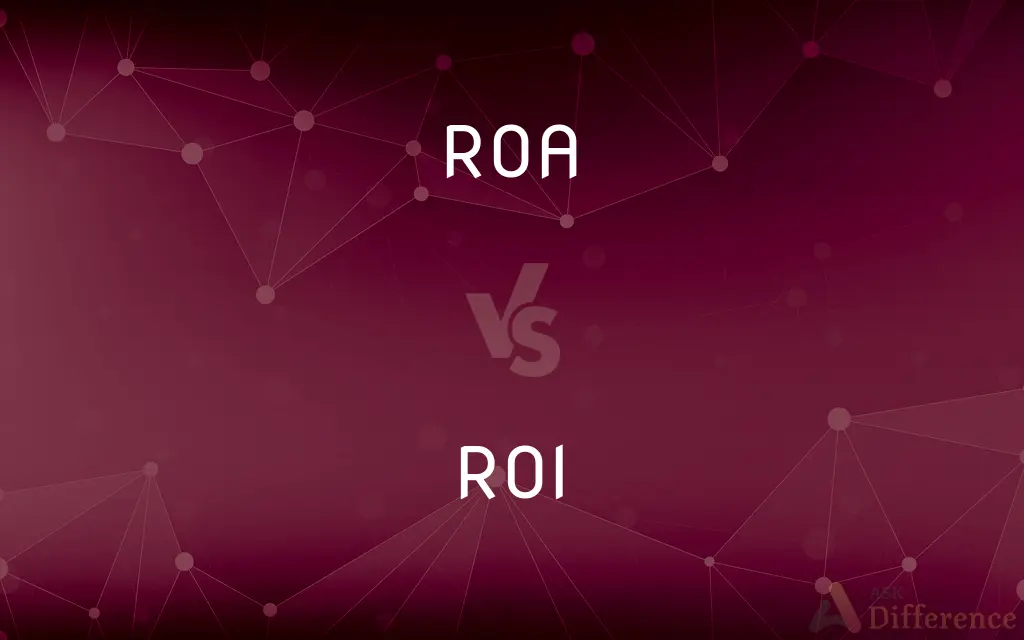ROA vs. ROI — What's the Difference?
By Tayyaba Rehman — Published on November 5, 2023
ROA (Return on Assets) measures profitability relative to total assets, while ROI (Return on Investment) evaluates the performance of an investment based on returns relative to its cost.

Difference Between ROA and ROI
Table of Contents
ADVERTISEMENT
Key Differences
ROA and ROI are both performance metrics used in finance and business to evaluate profitability and investment efficiency, but they serve different purposes and offer different perspectives. ROA, which stands for Return on Assets, gauges how efficiently a company's assets are used to generate earnings. It is calculated by dividing net income by total assets. By considering the entire asset base, ROA provides insight into the operational efficiency of a company. When analyzing ROA, a higher percentage suggests better utilization of assets in generating profit.
ROI, or Return on Investment, on the other hand, is a measure of the profitability of a particular investment relative to its cost. It's determined by dividing the net profit from the investment by its initial cost, then multiplying by 100 to get a percentage. This metric is broader than ROA as it can be applied to any investment, whether it's in stocks, real estate, or marketing campaigns. It provides a clear picture of the effectiveness of an investment strategy.
In essence, while both ROA and ROI concern profitability, their scopes are distinct. ROA is more enterprise-centric, focusing on how well a company's assets generate earnings. ROI, conversely, is investment-centric, providing a snapshot of the return garnered from a specific investment relative to its cost.
Comparison Chart
Definition
Return on Assets
Return on Investment
Formula
Net Income / Total Assets
(Net Profit from Investment / Cost of Investment) x 100%
ADVERTISEMENT
Scope
Measures efficiency of a company's assets in generating profit
Measures profitability of a specific investment relative to its cost
Application
Primarily used in business finance
Used broadly in finance, business, and personal investments
Main Concern
Efficiency of assets
Efficiency of an investment
Compare with Definitions
ROA
Reflects operational efficiency.
The manager wanted to improve the company's ROA by optimizing asset use.
ROI
Helps in making informed investment decisions.
Before launching the campaign, the company estimated its potential ROI.
ROA
Useful for comparing companies in the same sector.
Investors often analyze ROA to determine which firm uses assets most effectively.
ROI
A metric that evaluates the return on a particular investment.
The investor was pleased with a 10% ROI on his stock portfolio.
ROA
Indicates how much profit each dollar of assets generates.
With a 5% ROA, for every dollar in assets, the company made five cents in profit.
ROI
Expresses profitability as a percentage.
Using ROI, marketers can quantify the success of advertising campaigns.
ROA
A financial ratio illustrating profit relative to total assets.
A high ROA indicates that the company efficiently uses its assets to generate profit.
ROI
Compares the gain from an investment to its cost.
A positive ROI indicates that the benefits of the investment exceeded its costs.
ROA
Incorporates all earnings and assets.
By taking all assets into account, ROA offers a comprehensive view of financial performance.
ROI
Applies to various investments, including stocks, real estate, and marketing.
The ROI of the real estate property was higher than expected, making it a smart buy.
Common Curiosities
Is a higher ROA always better?
Generally, a higher ROA is favorable, but it's important to compare ROA values within the same industry for context.
What does ROA tell about a company?
ROA indicates how efficiently a company uses its assets to produce profit.
What can affect ROI in a business context?
Factors like operational costs, revenue generated, market conditions, and the initial investment cost can influence ROI.
Can ROI be negative?
Yes, a negative ROI indicates that the investment resulted in a loss relative to its cost.
How often should companies assess their ROA?
While it varies by company, many assess ROA annually during financial reviews.
Can ROA be used to compare companies across different industries?
While possible, it's more accurate to compare ROA values of companies within the same sector.
Are ROI and Return on Equity (ROE) the same?
No, while ROI measures return on a specific investment, ROE focuses on a company's return on shareholder equity.
What's a good ROI percentage?
A "good" ROI varies by industry and risk profile, but generally, a positive ROI is favorable.
Can external factors influence ROA?
Yes, factors like market conditions, competition, and economic trends can impact ROA.
Is ROI specific to financial markets?
No, ROI can be used to evaluate the return of any investment, from stocks to marketing campaigns.
Can a company have a high ROA but low profitability?
While uncommon, it's possible if the company's asset base is relatively small.
Is it possible for a company to have a positive ROA and a negative net income?
Generally, if a company has a negative net income, its ROA would also be negative.
How can businesses improve their ROA and ROI?
Strategies might include optimizing asset utilization, reducing costs, and enhancing investment strategies.
How are non-financial gains represented in ROI?
ROI typically focuses on financial returns, but it can be adjusted to account for non-financial gains using estimated monetary values.
Which is broader in scope, ROI or ROA?
ROI is broader, applicable to any investment, while ROA is specific to a company's assets.
Share Your Discovery

Previous Comparison
Attribute vs. Parameter
Next Comparison
Black Body vs. Grey BodyAuthor Spotlight
Written by
Tayyaba RehmanTayyaba Rehman is a distinguished writer, currently serving as a primary contributor to askdifference.com. As a researcher in semantics and etymology, Tayyaba's passion for the complexity of languages and their distinctions has found a perfect home on the platform. Tayyaba delves into the intricacies of language, distinguishing between commonly confused words and phrases, thereby providing clarity for readers worldwide.
















































